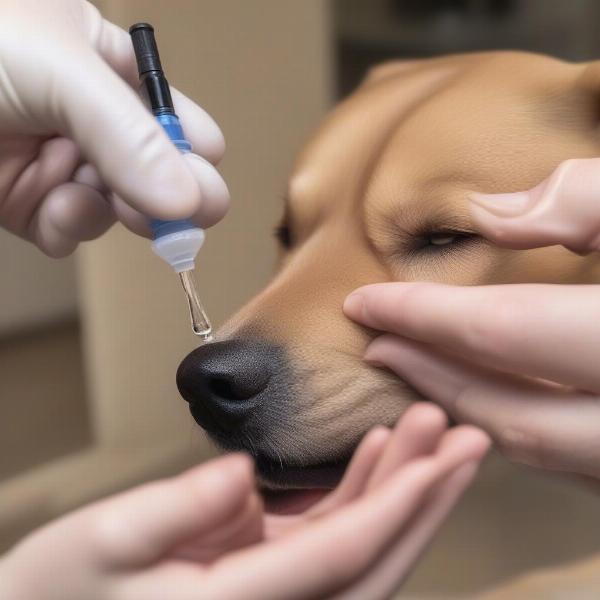The atropine response test (ART) is a diagnostic tool used in veterinary medicine, particularly in ophthalmology, to assess certain eye conditions in dogs. While not a common household term, understanding the basics of the ART can be valuable for dog owners concerned about their pet’s eye health. This article will delve into the what, why, and how of the atropine response test, providing dog owners with the information they need to navigate conversations with their veterinarian.
What is the Atropine Response Test?
The atropine response test assesses the function of the iris sphincter muscle, which controls the size of the pupil in your dog’s eye. Atropine, a medication that dilates the pupil, is administered to the eye. The subsequent change in pupil size is then observed and measured. This response can provide insights into various ocular conditions.
Why is the Atropine Response Test Performed?
The ART is primarily used to diagnose or rule out certain conditions, including:
- Horners syndrome: This neurological disorder affects the nerves that control facial muscles, including those in the eye. One symptom is a constricted pupil, and the ART can help determine the location of the nerve damage causing the issue.
- Iris atrophy: This condition involves the degeneration of the iris, the colored part of the eye. The ART can help assess the extent of the atrophy and its impact on pupil function.
- Uveitis (Anterior Uveitis): Inflammation of the uvea, the middle layer of the eye, can cause painful constriction of the pupil. The ART helps evaluate the severity and responsiveness of the inflammation to treatment.
How is the Atropine Response Test Conducted?
The procedure is relatively straightforward. A small amount of atropine solution is instilled into the affected eye. The veterinarian then measures the pupil size at regular intervals, usually over a period of 30-60 minutes, to monitor how it responds to the medication. A normal response is dilation of the pupil. A slow or absent dilation might indicate an underlying problem.
Interpreting the Results of the Atropine Response Test
Interpreting the ART requires veterinary expertise. Different conditions will result in variations in pupil dilation. For instance, in Horner’s syndrome, the affected pupil may dilate more slowly compared to the normal eye. In iris atrophy, the pupil may not dilate fully. Your veterinarian will consider the test results in conjunction with other clinical signs and diagnostic tests to reach a definitive diagnosis.
Frequently Asked Questions About the Atropine Response Test in Dogs
- Is the atropine response test painful for my dog? The application of atropine drops can sometimes cause mild, temporary discomfort.
- Are there any side effects of the atropine response test? Temporary blurred vision and increased sensitivity to light are common side effects.
- How long does the atropine response test take? The procedure itself is quick, but monitoring the pupil response can take up to an hour.
- What does a positive atropine response test mean? A positive response, meaning pupil dilation, can indicate several conditions, including Horner’s syndrome.
- What does a negative atropine response test mean? A minimal or absent dilation could suggest issues like iris atrophy.
 Administering atropine eye drops to a dog
Administering atropine eye drops to a dog
Conclusion
The atropine response test is a valuable diagnostic tool for assessing specific eye conditions in dogs. While this article provides a comprehensive overview, it is crucial to remember that it should not replace professional veterinary advice. If you have any concerns about your dog’s eye health, consult with your veterinarian. They can perform a thorough examination and determine if the atropine response test is necessary for your pet.
ILM Dog is your trusted resource for expert dog care advice and information. We offer guidance on a range of topics including Breed Selection, Health & Medical Care, Training & Behavior, Nutrition & Feeding, Grooming & Hygiene, and Products & Accessories. Connect with our experts for tailored advice. Email: [email protected] Phone: +44 20-3965-8624 Visit us at ILM Dog for more valuable insights into canine care.